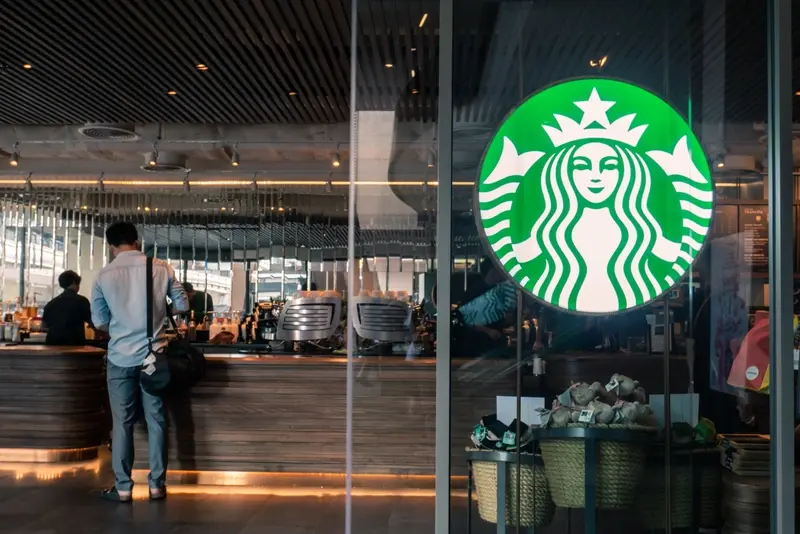
It was another topsy-turvy week for US markets buffeted by macro data which revealed stronger than expected wage growth on Tuesday (30 Apr) after the employment cost index rose 1.2% compared with 1% expected by economists.
Labour costs increased 4.2% year on year in the first quarter, a similar pace to the prior quarter which gives the Fed little wriggle room to cut interest rates anytime soon. Fed chair Powell sounded dovish tones at this week’s press conference after the Fed kept interest rates on hold, playing down any fears of a pivot to higher rates and giving equity markets a slight boost.
All eyes move to today’s (3 May) non-farm payrolls with economists expecting 243,000 jobs were created in April compared with 303,000 last month.
Apple (APPL:NASDAQ) was the big stock focus and the shares gained 5% in after-hours trading after the company announced its biggest ever share buyback totalling $110 billion and hiked its quarterly dividend by 4%, pleasing investors.
STARBUCKS
Starbucks (SBUX:NASDAQ) shareholders were left spluttering into their cappuccinos and macchiatos after the coffee retailer served up (30 April) weaker-than-expected second quarter sales and earnings.
The Seattle-headquartered coffeehouse colossus also slashed its 2024 full-year guidance, citing subdued demand in home market the US and a slower-than-expected recovery in China. A prediction from the company that its cafes will continue to underperform for several quarters spooked investors, sending the shares down 17% over the week to a one-year low of $74.4.
For full year 2024, the struggling coffee giant now expects to generate low single digit revenue growth, a downgrade on earlier guidance for growth in the 7% to 10% range. CEO Laxman Narasimhan conceded the quarter ‘did not meet our expectations, but we understand the specific challenges and opportunities immediately in front of us’. He also insisted Starbucks’ ‘Triple Shot Reinvention with Two Pumps’ strategy will deliver on ‘the limitless potential of this brand’.
SUPER MICRO COMPUTER
When things get really hot, they usually get dropped, and investors dropped Super Micro Computer (SMCI:NASDAQ) en masse over the past week. The stock tanked 14% post third quarter results but working out why is another matter. Earnings didn’t really disappoint, with Q3 EPS of $6.65 per share coming in $0.85 better than the analyst estimates, although revenue was a little soft. Guidance can’t be blamed either, the $45 billion company steering Q4 EPS between $7.62 and $8.42, versus the consensus of $7.14 on a revenue range of $5.1 billion and $5.5 billion, versus the consensus of $4.89 billion.
As the world hurtles into a new technological era led by AI and machine learning, Super Micro Computer’s innovative energy-efficient, liquid cooled servers are seen as must-haves by many, and analysts remain largely behind the investment story.
Analysts at Loop Capital have a $1,500 price target on Super Micro stock, and they talked up June quarter guidance and subsequent quarter-on-quarter revenue ramp commentary. ‘The core of our thesis is both our net-bullish Gen AI server industry posture and as an increasing leader in the need for both complexity and scale,’ wrote Loop Capital.
MCDONALD’S
McDonald’s (MCD:NYSE) missed first quarter profit expectations (30 April) for the first time in two years, suggesting past price increases are starting to bite cash strapped consumers.
Global comparable sales grew 1.9% to notch-up their 13th consecutive gain but the outcome fell short of analysts’ estimates calling for 2.3% growth. The quarter saw a big deceleration compared to the 12.6% growth recorded in the same quarter of 2023.
Consolidated sales came in roughly in line with estimates, showing a 4.6% increase to $6.2 billion. Adjusted EPS (earnings per share) was 2.66% ahead year on year to $2.7, slightly below the $2.72 pencilled in by analysts.
Chief financial officer Ian Borden said: ‘The consumer is certainly being very discriminate in how they spend their dollar.’
CEO Chris Kempczinski described industry traffic across major markets as ‘flat to declining’ against a ‘difficult’ macro environment. The company also pointed to war in the Middle East impacting same store growth. The shares are down 8% so far in 2024 compared with a 7% gain in the S&P 500 index.




